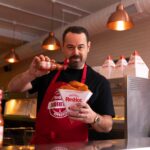Pete Fraser, chief executive officer at Cornish Fish & Chips, which owns Harbour Lights in Falmouth and Fraser’s in Penzance & Helston, shares his advice on surviving in the current climate
Many of my good friends in the trade have said to me over the years it is better to be a master of one trade rather than a jack of all trades, by which they mean be the best in the area for the quality of your fish and chips. And while I agree with that during normal times, these certainly aren’t normal times. Everyone is feeling a squeeze on profits and if you just concentrate on fish and chips you potentially could be making things harder for yourself.
Plus we have to face facts, the average age of fish and chip customers is getting older and we’ve got to appeal to the younger generation. I’m not saying we’re going to start selling kebabs but at Harbour Lights in Falmouth, which is a university town, the young students have really embraced our vegan offerings. I think any shop that’s not looking at that is missing a trick. We have also added a selection of big, juicy burgers and chicken to the menu and we’re finding the profit margins available are certainly a lot higher than on fish.
Another thing shops need to be looking at is their figures, it’s something we do not just on a weekly or monthly basis but daily. For us, the most important figure is ‘profit contribution’, what is left when prime costs are taken away from sales. Prime costs is a term that Americans use (whatever you think of the Yanks, they are experts in the hospitality trade), it is the combination of payroll and cost of goods. We watch this figure like a hawk and react quickly if it deviates from what we forecast it to be. If that figure is under control, then you’ve got a fighting chance of making a decent profit. But you’ve got to have systems in place so you are recording it on a minimum of a weekly basis.
Something else I’d recommend shops do is double-down on their story. We are unapologetically the most expensive shop in the towns we operate in, yet we are also the most popular so how do you get to that position? By being a good storyteller.
We’re constantly telling our customers about sustainability, what we’re doing for the local community, about the top quality products we source. Every shop will have its own USP but how good are you at telling your customers about it?
A good tip I picked up is that when you are telling a story, you want to make the customer the hero for making the right buying choice as opposed to singing your own praises, because psychologically it is received a lot better and leads to more positive reaction.
I also believe in rewarding loyal customers. I don’t mean become known as the discount king but those customers that come back time and again should know they are appreciated and be looked after. We have been researching digital loyalty schemes because everyone is on smartphones these days, plus we want to know who are loyal customers are, how often they are visiting and what are they buying. We went for a platform called Vita Mojo, which we’re looking forward to launching in early September.
And finally, I recommend all shop owners read Double Your Profits in Six Months or Less by Bob Fifer. It’s an old book but it’s ultra easy to read and, while in the current economic climate it may not double your profits, it may stop your profits from being halved.








